小学英语三年级:人称代词的宾格+常用固定短语
小学英语人称代词、物主代词用法整理
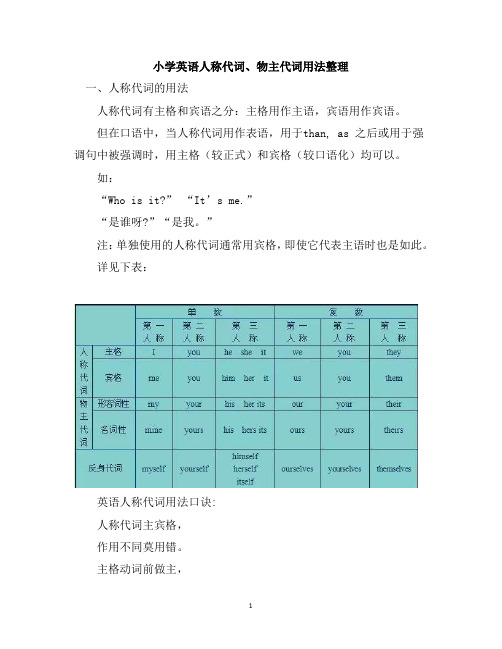
小学英语人称代词、物主代词用法整理一、人称代词的用法人称代词有主格和宾语之分:主格用作主语,宾语用作宾语。
但在口语中,当人称代词用作表语,用于than, as 之后或用于强调句中被强调时,用主格(较正式)和宾格(较口语化)均可以。
如:“Who is it?” “It’s me.”“是谁呀?”“是我。
”注:单独使用的人称代词通常用宾格,即使它代表主语时也是如此。
详见下表:英语人称代词用法口诀:人称代词主宾格,作用不同莫用错。
主格动词前做主,动词介词后宾格。
You和it主宾同,其他主宾须分清。
人称代词并列现,尊重他人礼当先。
单数人称二三一,复数人称一二三。
若把错误责任担,第一人称我靠前。
二、物主代词的用法物主代词分形容词性物主代词和名词性物主代词。
形容词性物主代词在句中只用作定语;名词性物主代词则不能用作定语,但可以用作主语、宾语、表语、连用of作定语等。
如:Here is my dog. Its name is Tom.这是我的狗,它的名字叫汤姆。
注:可以说 a friend of mine (ours, yours, hers, his, theirs),但是不能说 a friend of me (us, you, her, him, them)。
英语物主代词用法口诀:物主代词分两种,形容词性名词性。
形容词性能力差,自己不能来当家。
句子当中作定语,身后定把名词加。
物主代词名词性,相当名词可单用。
句中充当主宾表,身后没有名词影。
两种代词形不同,添个 s 形变名。
his,its不用变,my变mine要记清。
三、反身代词的用法反身代词可用作宾语、同位语、表语等。
用作同位语时,主要用于加强被修饰词的语气,可紧放在被修饰名词后或句末。
如:She is too young to look after herself.她太小,无法照顾自己。
注:用于 be, feel, seem, look 等后作表语表示身体或精神处于正常状态。
小学英语人称代词口诀
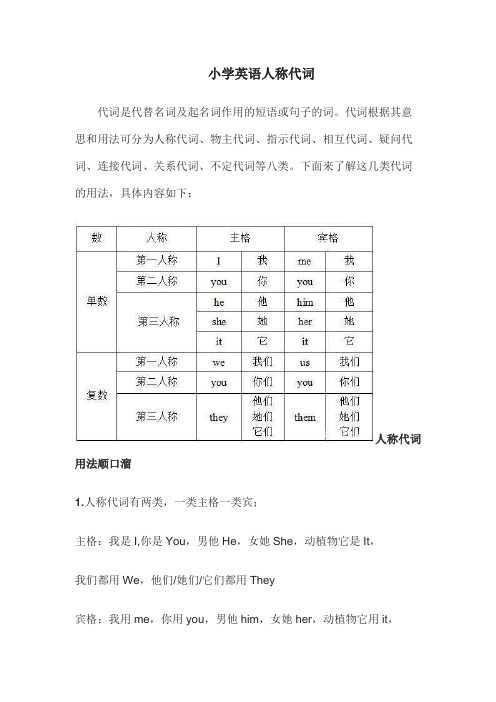
小学英语人称代词代词是代替名词及起名词作用的短语或句子的词。
代词根据其意思和用法可分为人称代词、物主代词、指示代词、相互代词、疑问代词、连接代词、关系代词、不定代词等八类。
下面来了解这几类代词的用法,具体内容如下:人称代词用法顺口溜1.人称代词有两类,一类主格一类宾;主格:我是I,你是You,男他He,女她She,动植物它是It,我们都用We,他们/她们/它们都用They宾格:我用me,你用you,男他him,女她her,动植物它用it,我们us,你们you,他们/她们/它们用them。
2.主格代词本领大,一切动作由他发;I want to swim.You can read and write.They are playing basketball.3.宾格代词不动脑,跟着动词介词跑;Let us sing a song together.Give him a cup of tea,please.She is waiting for me.Look at them.4.人称代词并列现,单数人称二三一,复数人称一二三。
You,she and I are good friends.We,you and they all like sports.人称代词的用法人称代词有主格和宾语之分:主格用作主语,宾语用作宾语。
但在口语中,当人称代词用作表语,用于than, as 之后或用于强调句中被强调时,用主格(较正式)和宾格(较口语化)均可以。
如:“Who is it?” “It’s me.” “是谁呀?”“是我。
”英语人称代词用法口诀:人称代词主宾格,作用不同莫用错。
主格动词前做主,动词介词后宾格。
You和it主宾同,其他主宾须分清。
人称代词并列现,尊重他人礼当先。
单数人称二三一,复数人称一二三。
若把错误责任担,第一人称我靠前。
二、物主代词的用法物主代词分形容词性物主代词和名词性物主代词。
形容词性物主代词在句中只用作定语;名词性物主代词则不能用作定语,但可以用作主语、宾语、表语、连用of作定语等。
英语人称代词顺口溜 有哪些人称代词的记忆口诀
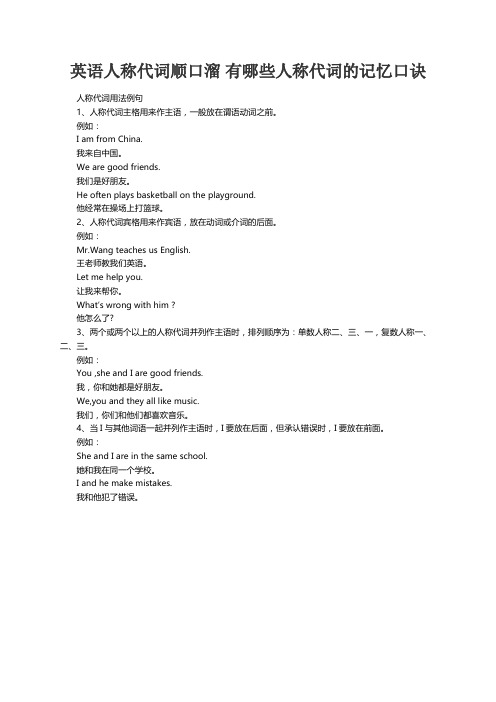
英语人称代词顺口溜有哪些人称代词的记忆口诀
人称代词用法例句
1、人称代词主格用来作主语,一般放在谓语动词之前。
例如:
I am from China.
我来自中国。
We are good friends.
我们是好朋友。
He often plays basketball on the playground.
他经常在操场上打篮球。
2、人称代词宾格用来作宾语,放在动词或介词的后面。
例如:
Mr.Wang teaches us English.
王老师教我们英语。
Let me help you.
让我来帮你。
What’s wrong with him ?
他怎么了?
3、两个或两个以上的人称代词并列作主语时,排列顺序为:单数人称二、三、一,复数人称一、
二、三。
例如:
You ,she and I are good friends.
我,你和她都是好朋友。
We,you and they all like music.
我们,你们和他们都喜欢音乐。
4、当I与其他词语一起并列作主语时,I要放在后面,但承认错误时,I要放在前面。
例如:
She and I are in the same school.
她和我在同一个学校。
I and he make mistakes.
我和他犯了错误。
人称代词的宾格形式及用法(一)
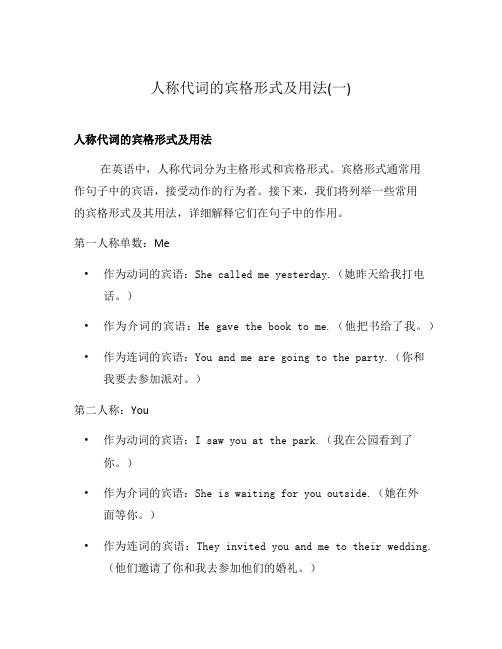
人称代词的宾格形式及用法(一)人称代词的宾格形式及用法在英语中,人称代词分为主格形式和宾格形式。
宾格形式通常用作句子中的宾语,接受动作的行为者。
接下来,我们将列举一些常用的宾格形式及其用法,详细解释它们在句子中的作用。
第一人称单数:Me•作为动词的宾语:She called me yesterday.(她昨天给我打电话。
)•作为介词的宾语:He gave the book to me.(他把书给了我。
)•作为连词的宾语:You and me are going to the party.(你和我要去参加派对。
)第二人称:You•作为动词的宾语:I saw you at the park.(我在公园看到了你。
)•作为介词的宾语:She is waiting for you outside.(她在外面等你。
)•作为连词的宾语:They invited you and me to their wedding.(他们邀请了你和我去参加他们的婚礼。
)第三人称单数:Him/Her/It•作为动词的宾语:–He loves her with all his heart.(他全心爱着她。
)–The dog chased it all around the yard.(狗在院子里追逐着它。
)•作为介词的宾语:–I gave him the gift.(我给了他礼物。
)–The teacher talked to her after class.(老师课后和她谈话。
)•作为连词的宾语:The boss wants to meet him tomorrow.(老板明天想和他见面。
)第一人称复数:Us•作为动词的宾语:They invited us to the party.(他们邀请我们参加派对。
)•作为介词的宾语:Let’s bring the snacks with us.(让我们带上零食。
)•作为连词的宾语:You and us can work together on this project.(你和我们可以一起合作这个项目。
小学英语三学年-人称代词的宾格常用固定短语
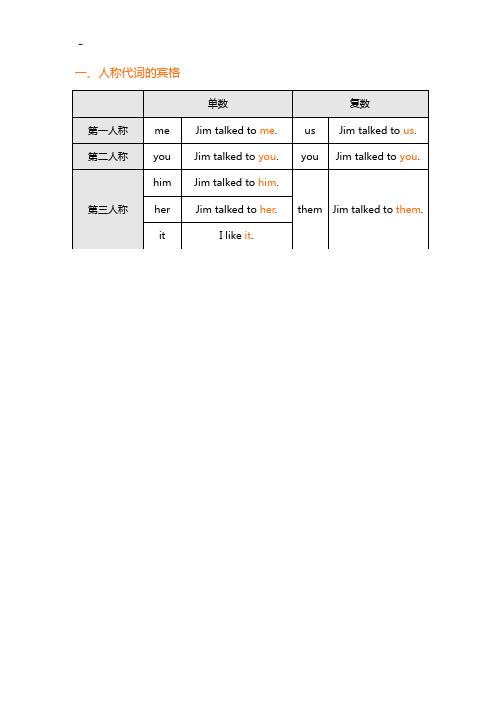
一、人称代词的宾格二、常用固定短语搭配1. put down 放下shut down 把…关上cut down 砍掉come down 下来、落下slow down 减缓、放慢sit down 坐下write down 写下get down 下来,降落2. after all 毕竟.终究after that 于是.然后day after day 日复一日地one after another 相继.挨次soon after 不久以后the day after tomorrow 后天3. come up with 找到、提出catch up with 赶上wake up 弄醒、醒来send up 发射open up 开设、开办grow up 长大pick up 拾起、捡起hands up 举手eat up 吃光clean up 打扫干净give up doing sth.=stop doing sth. 放弃做某事4. arrive at/in + n. 到达get to +n. 到达reach + n. 到达arrive / get +adv. 到达5. get…back 退还,送回去.取回give back 归还come back 回来at the back of 在…的后面on the way (back)home 在回家路上6. at least 至少at breakfast 早餐时at desk 在桌前at once立刻,马上at school 在上学at the same time 同时at work 在工作be good at=do well in 擅长laugh at 嘲笑not…at all 一点也不at first 起初at night 在晚上at noon 中午at the age of // when sb. was…years old 在…岁时at last / in the end / finally 最后、终于at the beginning of the twenty-first century 在21世纪初at the end of 在…终点、结尾at the moment // now现在at the foot of 在…脚下at Christmas 在圣诞节at any moment 任何时候at times(sometimes) 有时,偶尔at the doctor’s 在医务室be bad at不擅长7. for example 例如for ever 永远be good for 对…有益be bad for 对…有害for long=for a long time 长期for short 简称be short for 是…的简称TV is short for “television”8. come true 实现come down 下来come from=be from 来自,出生于come in/into 进入,进来come on 赶快come over 过来come along 走吧,过来,快点come and go 来来去去come up 上来come out 出来,(花)开,(照片)冲洗出来9. even though=even if 即使、虽然、尽管10. be pleased with 对…感到满意be covered with 被…覆盖be expected to do sth. 被期望做某事be proud of 以…自豪speak highly of 称赞be afraid of 害怕hear of 听说(hear from sb.收到某人的来信) of course=certainly 当然可以plenty of= a lot of 许多11. by the way 顺便说by oneself 单独,独自by the end of 到…为至by the time (引起时间状语从句)到…的时候one by one 依次by air / plane 乘飞机by bus / train / car 乘公共汽车/火车/轿车catch a bus 赶公交车get on / off the bus上/下车take a bus to…=go to …by bus乘车去12. do / try one’s best 尽力do one’s homework 做家庭作业do (the/some) shopping 购物do the cooking 烹饪do some cleaning 打扫do the / some washing 洗衣服do sport 做运动do with sb / sth. 处理well done 干得好13. early in the morning 一大早in the early spring 初春in my early days 我幼年时期early bus 早班车14. make a contribution to 贡献给、捐献make a telephone call to sb. // ring sb. up // give sb. a call //phone sb.给某人打电话connect…to…把…与…连接起来be close to 靠近(某地)give birth to 生(孩子)lose to sb 输给sb .15. either…or…或者…或者…on either side of the street 街道任何一边on each side of the street 街道每一边on both sides of the street 街道两边16. keep doing sth. 不停地做某事(表示状态继续)keep on doing sth. 坚持做某事(表示动作反复进行)practise doing sth. 练习做某事enjoy doing sth. 喜欢做某事finish doing sth. 做完某事go on doing sth. 继续做某事(同一件事) 17. go on to do sth. 接着做某事(另一事) go straight along 沿着…一直往前走go down 下降go for a walk 散步go over 复习go shopping 买东西go to the cinema 去看电影go well 进展顺利go off to 动身前往go out 外出go to work 去上班go up 上升want a go 想试一试18. think about 考虑think of 认为、想起、考虑、想到think over 仔细考虑think out 想出talk about 谈论worry about 担心How / What about…?…怎么样?19. borrow…from …从…借…lend…to…把…借给…from door to door 挨家挨户from time to time 时时from now on 从今以后from then on 从那以后be different from 与…不同learn…from…向…学习20. get dressed 穿衣get into 进入get / be lost 丢失get off / on下/ 上车get on well with sb. 与某人相处得好get out of 从…出来get ready for +n. 为…做准备get ready to do sth. 准备做某事get / go to sleep (fall asleep) 入睡be asleep 睡着get warm 变暧get well 康复get a chance 有机会、得到机会21. look for 寻找wait for 等候look after=take care of 照看look like 看起来像look over 检查,复习look out 小心,从里向外看look the same 看起来一样look up 向上看,查单词look around 环视look forward to 期望look through 温习,检查22. set off 出发、动身put off 推迟keep off 避开、不靠近…drop off 放下(某物)turn off 关jump off 跳离take off 脱(衣),(飞机)起飞23. half a kilo 半千克half an hour 半小时in half 分成两半half of the day 半天24. do eye exercises 做眼保健操do morning exercises 做早操take (more) exercise (多)参加体育锻炼an exercise book 练习本25. take part in 参加hand in 上交in hospital 住院in surprise 吃惊地in the sun 在阳光下in trouble 处于困境in a minute / moment马上26. leave for…动身去某地27. feed on 以…为主食live on 继续活着base on 以…为根据carry on 坚持、继续下去and so on 等等on the other hand 另一方面on foot 步行28. be famous for 以..著名be excited about +n./V-ing 对…感到兴奋be interested in 对…感兴趣be born 出生be busy with sth.=be busy doing sth. 忙于…be amazed at 对..感到惊讶29. move away 移开move to (搬)移到30. search the Internet 上网31. make sure 确信make a dialogue 编对话make a mistake 犯错误by mistake 由于疏忽make a noise 吵闹make faces 做鬼脸make friends (with) 和..交朋友make room for 给..让地方make tea 沏茶make money 赚钱make a decision 作出决定32. used to do sth 过去常常做某事be used to doing sth. 习惯于做某事33. leave sth+介词短语“把……忘记在某处”34. forget to do sth. 忘记做某事encourage sb. to do sth. 鼓励某人做某事decide to do sth. 决定做某事allow sb. to do sth. 允许某人做某事35. hear sb. to do (doing)sth. 听见某人做某事36. help sb. (to) do sth .//help sb. with sth. 帮助某人做某事with one’s help 在某人的帮助下with pleasure 乐意37. the summer holiday(s) 暑假the winter holiday(s) 寒假38. step into 走进pour into 倒入…39. in the first 第一for the first time 第一次at first 起初a firs t language 母语first of all 首先40. leave a message for sb. 给某人留条give / take sb. a message 给某人捎口信41. take photos / pictures 照像take away 拿走take out 取出work out 算出take care 当心take medicine 服药take one’s temperature 量体温take one’s time 别着急take a walk 散步take place 发生42. learn by oneself / teach oneself 自学learn by heart 背熟43. a year and a half (one and a half years ) 一年半44. have a try 尝试,努力try out 尝试、试验find out / about 找出,查明have a good / wonderful / great / time 玩得开心have a (bad) cold (重)感冒have a meeting / walk / watch 开会/散步/比赛have sports 进行体育活动have nothing / sth. to do with 与..无(有)关have no idea 不知道have (one’s) medicine 服药45. offer sb sth. 给某人提供某物46. win first prize 获一等奖47. all over the world= around the world =throughout the world 全世界48. all kinds of 各种各样的49. neither…nor 既不…也不….50. not only …but also …不但…而且both…and ……和…都51. the more , the better 越多越好52. all one’s life 一生53. as soon as 一…就…as soon as possible 尽可能早地、尽快as well = too也as much as 至多as little as 至少regard …as 把…当作…as if 好像54. no matter 无论…55 ever since 从那以后,此后一直56. so far 到目前为止or so大约57. another two hours (=two more hours ) 又(再) 2个小时58. three times a week 一周三次59. the number of…的数量a (large / good) number of / large numbers of / many 许多60. less than少于, less and less 越来越少61. …is another way of saying…什么是..的另一说法Quick is another way of saying fast. Bike is short for bicycle.62. not…until…直到…才…63. be like 像feel like +n./V-ing 想要like best 最喜欢, would like to 想要64. the 24 hour clock 24 小时制65. wash away 冲走run away 逃跑take away 带走66. before long 不久long before / ago 很久以前for long =for a long time 长期no longer = not. .any longer 不再67. more or less = about 或多或少,大约more than = over 多于,超过68. every year 每年every four years 每隔四年every other day 每隔一天everyday English / life 日常英语/生活69. next to 紧挨着next door 隔壁,邻居next year 明年next time 下次70. receive / get / have a letter from sb. = hear from sb 收到某人的来信71. on show = on display 展览72.be filled with / be full of 充满…73. thank to =because of 由于74. some day =one day (将来)某一天all day 终日day and night 日日夜夜in a day or two 一两天内in the old days 从前,旧社会from day to day (day after day) 日复一日the day before yesterday 前天the day after tomorrow 后天Tree Planting Day 植树节Women’s Day 妇女节75. keep / stop / prevent…(from) doing sth. 防止(阻止)…做某事stop to do sth. 停下来去做某事stop doing sth. 停止做某事76. nice and +adj. = very +adj. 很,非常77. a place (places) of interest 名胜78. three quarters of the information on the Internet 因特网上四分之三的信息two thirds of the books 三分之二的书79. credit card 信用卡80. the increasing population 增长着的人口81. a path of travel 旅行路线82. point at / to 指向83. by sea = by ship 乘船by the sea = on the sea 在海边at sea在海上84. set one’s mind to do sth. 一心想做某事85. multiply…by…乘以…86. See you! 再见You see. 你知道,你明白,你瞧Let me see. 让我想想see sb. off 给某人送行see a / the doctor 看病see sb . do / doing sth. 看见某人做某事87. some…others 一些(人,物)…其他(人,物) one…another 一个..另一个(三者或以上) one…the other 一个…另一个(总数二个) 88. be worn out 穿旧,磨坏check out 核实,检查write out 写出take sth. out of 从…拿出/取出某物89. in this way 用这种方法in a few year’s time 几年以后in space 在太空in and out of class 在课内课外in the last fifteen minutes 在最后十五分钟里in the second half 在下半场later in one’s life 在某人后半身in the air 在空中in the open air 在户外90. give sb. an injection给某人打针, get an injection打针91. have been to 去过某地have gone to 到某地去了92. here + be+ 名词+ for+某人( Here is a letter for you. 这儿有你的一封信.)93. be far behind +某人(He is far behind others. 他落后于别人)94. one of + adj. 最高级+复数名词95. take +某物+with +某人(You’d better take an umbrella with you. 你最好带上雨伞) 96. prefer to= like…better than 宁愿,更喜欢prefer + V-ing (to do sth.) ( I prefer doing (to do) it myself .我喜欢自己做那件事). Would / should 等情态动词+ prefer +不定式. (I would prefer to do it myself.我宁愿自己做那件事)prefer +名词(v-ing) + to+名词(v-ing) (I prefer learning English to playing football.我愿意学英语而不愿踢足球)prefer +不定式(名词)+ rather than + 不带to 的不定式, (I prefer to walk there rather than go by bus.我喜欢走着去那里, 而不愿乘车) prefer + 名词(代词) to do sth. (We prefer her not to come.我们宁愿她不来)97. 人+ spend +time (money) +(in) doing sth. (I spent over two hours (in) finishing my homework.我花了两个多小时完成家庭作业.)人+ spend + time (money) + on +名词, (He spent 1,000 on the TV set .他花了一千元买电视机)人+ pay + money +for +sth. ( He paid ten yuan for the book .他花了10元钱买那本书.) It + takes (will take, / took…) + sb. + time (money) + to do sth. (It’ll take you only ten minutes to get there bybus.乘车去那里只花你10分钟)物+ cost + (sb.) + money, (The dictionary cost me 20 yuan .我花20元钱买了那本词典) 98. do with + sb. / sth. (What have you done with the pork ? 那些肉你怎么处理了?)99. mind + if 从句, (Do you mind if I open the window?我开窗你不反对吧?)mind + V-ing, (Would you mind turning on the TV?打开电视你不反对吧?) 100. what…for? / why…? (What do you learn English for? = Why do you learn English?)101. need + 名词(v-ing), (The students need some help.学生们需要帮助.This pair of shoes needs mending.这双鞋需要修理) 102. “be used for+ 名词(v-ing),”被用来做..(A writing brush is used for writing.)“be used as+名词”, 被作为…使用(English is used as the first language in none of these countries. )“be used by+动作执行者”, 被…使用, 103. be made of 由…制造(This table is made of wood .这张课桌是木制的)be made from由…制成(This kind of paper is made from wood . 这种纸是用木材制成的) be made in+地点, “某地制造”(These cars are made in Germany) be made by+人, “由谁制造的”(This kite is made by Kate . ) 104. more developed countries发达国家, less developed countries不发达国家, developing countries发展中国家105. be worth + money (V-ing),值…钱.值得做…This car is worth more than two million yuan in China. This book is wellworth reading.这本书很值得一读._106. the Summer Palace 颐和园Tian’an men Square 天安门广场the Palace Museum 故宫the Great Hall of the People 人民大会堂the Temple of Heaven 天坛the Great Green Wall 绿色长城PLA 中国人民解放军PRC 中华人民共和国the Party 中国共产党the League 共青团Peking Opera 京剧107. a digital camera 数字照相机a doctor for animals = an animal doctor 动物医生108. so + 形/副+that 从句(The place is so cold that nothing can grow in winter .这地方太冷,冬天什么都不长)so + many / few+ 复数名词+that从句(He has so many books that I don’t know which one to borrow. 他有那么多书,我不知道借哪一本)so + much / little+ 不可数名词+that从句(She has so little money that she can’t buy anything .她钱太少,什么也买不到.)so+ 形容词+a / an +单数名词+that从句(This is so good a book that all of us like reading it )such +a / an+ 形容词+单数名词+ that从句(This is such an intesting story that all of us like it)such +形容词+复数名词+that从句. such +形容词+不可数名词+that从句(It is such fine weather today that many children are playing outside)109. tell sb about sth.告诉某人关于某事, tell sb+从句, tell sb. to do sth.让某人做某事tell a lie说谎, tell a story讲故事, thank you for +n ./V-ing 谢谢你…too + adj. / adv. + to + v.太…而不能, toomuch(修饰名词)太多,过分, much too(修饰adj./adv.)太110. hope / wish+不定式(或从句), wish sb. to do sth. What do you mean by…?= What does…mean?…是什么意思?。
英语人称代词顺口溜有哪些人称代词的记忆口诀

英语人称代词顺口溜有哪些人称代词的记忆口诀英语人称代词顺口溜人称代词主宾格,作用不同莫用错。
主格动词前做主,动词介词后宾格。
You和it主宾同,其他主宾须分清。
人称代词并列现,尊重他人礼当先。
单数人称二三一,复数人称一二三。
若把错误责任担,第一人称我靠前。
扩展资料人称代词用法例句1、人称代词主格用来作主语,一般放在谓语动词之前。
例如:I am from China.我来自中国。
We are good friends.我们是好朋友。
He often plays basketball on the playground.他经常在操场上打篮球。
2、人称代词宾格用来作宾语,放在动词或介词的后面。
例如:Mr.Wang teaches us English.王老师教我们英语。
Let me help you.让我来帮你。
What’s wrong with him ?他怎么了?3、两个或两个以上的人称代词并列作主语时,排列顺序为:单数人称二、三、一,复数人称一、二、三。
例如:You ,she and I are good friends.我,你和她都是好朋友。
We,you and they all like music.我们,你们和他们都喜欢音乐。
4、当I与其他词语一起并列作主语时,I要放在后面,但承认错误时,I要放在前面。
例如:She and I are in the same school.她和我在同一个学校。
I and he make mistakes.我和他犯了错误。
英语小学代词知识点总结
英语小学代词知识点总结一、人称代词(Personal Pronouns)人称代词用来代替人的名词,可以表示说话人(第一人称)、对话的人(第二人称)、和被谈论的人(第三人称)。
在英语中,人称代词有主格和宾格两种形式。
1. 主格人称代词(Subject Pronouns)主格人称代词用在句子中作主语,通常在句子开头出现。
主格人称代词包括:I(我)、You(你)、He(他)、She(她)、It(它)、We(我们)、They(他们/她们)。
例如:I am a student.(我是一个学生。
)He likes playing basketball.(他喜欢打篮球。
)We are going to the park.(我们要去公园。
)2. 宾格人称代词(Object Pronouns)宾格人称代词用在句子中作宾语或介词后宾语。
宾格人称代词包括:Me(我)、You (你)、Him(他)、Her(她)、It(它)、Us(我们)、Them(他们/她们)。
例如:He is taller than me.(他比我高。
)I want to play with them.(我想和他们一起玩。
)They bought a present for her.(他们给她买了一份礼物。
)二、物主代词(Possessive Pronouns)物主代词用来表示拥有关系,替代名词在句子中表示所有关系。
物主代词包括:Mine(我的)、Yours(你的)、His(他的)、Hers(她的)、Its(它的)、Ours(我们的)、Theirs(他们/她们的)。
例如:This book is mine.(这本书是我的。
)The red sweater is hers.(那件红色毛衣是她的。
)Is this bag yours?(这个包是你的吗?)三、反身代词(Reflexive Pronouns)反身代词用来表示动作的承受者同时也是动作的发出者。
英语人称代词用法口诀
y英语人称代词用法口诀张志华人称代词主宾格,作用不同莫用错。
主格动词前做主,动词介词后宾格。
You和it主宾同,其他主宾须分清。
人称代词并列现,尊重他人礼当先。
单数人称二三一,复数人称一二三。
若把错误责任担,第一人称我靠前。
说明:英语人称代词是用来表示“我”、“你”、“他”、“她”、“它”、“我们”、“你们”、“他们”的代词。
英语人称代词有单复数和主宾格的变化。
详见下表:用法:1.人称代词主格用来作主语,一般放在谓语动词之前。
例如:I am from China.我来自中国。
We are good friends.我们是好朋友。
He often plays basketball on the playground.他经常在操场上打篮球。
2.人称代词宾格用来作宾语,放在动词或介词的后面。
例如:Mr.Wang teaches us English.王老师教我们英语。
Let me help you.让我来帮你。
What’s wrong with him ?他怎么了?3.两个或两个以上的人称代词并列作主语时,排列顺序为:单数人称二、三、一,复数人称一、二、三。
例如:You ,she and I are good friends.我,你和她都是好朋友。
We,you and they all like music.我们,你们和他们都喜欢音乐。
4.当I与其他词语一起并列作主语时,I要放在后面,但承认错误时,I要放在前面。
例如:She and I are in the same school.她和我在同一个学校。
I and he make mistakes.我和他犯了错误。
Excuse me通常在说或做可能令人不悦的事情之前使用;而Sorry在说或做这种事情之后使用,表示歉意。
Excuse me通常在要打扰别人或要打断别人谈话或要吸引别人注意时使用。
至于带疑问的语气与上升的语调,说Sorry?或Excuse me?又是什么意思呢?这样说那就不再是致歉的用语,而是英美人听不清楚对方说什么,请人家再说一遍时说的话。
英语人称代词用法口诀
英语人称代词用法口诀英语人称代词用法口诀人称代词主宾格,作用不同莫用错。
主格动词前做主,动词介词后宾格。
You和it主宾同,其他主宾须分清。
人称代词并列现,尊重他人礼当先。
单数人称二三一,复数人称一二三。
若把错误责任担,第一人称我靠前。
说明:英语人称代词是用来表示“我”、“你”、“他”、“她”、“它”、“我们”、“你们”、“他们”的代词。
英语人称代词有单复数和主宾格的变化。
详见下表:用法:1.人称代词主格用来作主语,一般放在谓语动词之前。
例如:I am from China.我来自中国。
We are good friends.我们是好朋友。
He often plays basketball on the playground.他经常在操场上打篮球。
2.人称代词宾格用来作宾语,放在动词或介词的后面。
例如:Mr.Wang teaches us English.王老师教我们英语。
Let me help you.让我来帮你。
What’s wrong with him ?他怎么了?3.两个或两个以上的人称代词并列作主语时,排列顺序为:单数人称二、三、一,复数人称一、二、三。
例如:You ,she and I are good friends.我,你和她都是好朋友。
We,you and they all like music.我们,你们和他们都喜欢音乐。
4.当I与其他词语一起并列作主语时,I要放在后面,但承认错误时,I要放在前面。
例如:She and I are in the same school.她和我在同一个学校。
I and he make mistakes.我和他犯了错误。
人称代词的主格和宾格用法口诀
人称代词的主格和宾格用法口诀1、主格宾格顺口溜是人称代词,分主语和宾语,只有八对区分。
2、 You(你),它的主客体是同一个形式,其他主客体必须区分。
3、谓语前用主格,动词后用宾格。
4、口语最灵活,表语也可以用宾格。
5、参见人称代词并置、注意顺序和礼貌。
6、一,三,三,二,三,第一个人最谦虚。
7、如果你为错误承担责任,第一个人必须带头。
拓展资料:主格宾格的用法口诀:人称代词有两类,一类主格一类宾;主格代词本领大,一切动作由它发;宾格代词不动脑,介动之后跟着跑。
名词所有格用法口诀:名词所有格,表物是“谁的”,若为生命词,加′s即可行,词尾有s,仅把逗号择;并列名词后,各自和共有,前者分别加,后者最后加。
若为无生命词,of所有格,前后须倒置,此是硬规则。
主格用法:主格,宾格作句子的宾语或表语。
物主代词分为形容词性物主代词和名词性物主代词。
形容词性物主代词起形容词的作用,在句中作定语。
名词性物主代词起名词的作用,在句中作主语或宾语。
宾格用法:1、人称代词的主格作主语,宾格作动词的宾语和介词的宾语。
2、人称代词作表语时,一般用宾格,特别是在日常会话中。
3、人称代词处在动词之前,会影响选用主格还是用宾格。
例如:but和except既可作介词也可作连词,因此在but或except之后,用主格还是用宾格就要慎重。
所有格用法:1、-’s所有格的用法:-’s所有格通常用于有生命者,但有时也可用于无生命的东西,如用于表时间或距离的名词后,用于表示国家、城市、组织机构等的名词后等。
2、双重所有格。
双重所有格就是指同时既使用-’s所有格又使用of所有格。
- 1、下载文档前请自行甄别文档内容的完整性,平台不提供额外的编辑、内容补充、找答案等附加服务。
- 2、"仅部分预览"的文档,不可在线预览部分如存在完整性等问题,可反馈申请退款(可完整预览的文档不适用该条件!)。
- 3、如文档侵犯您的权益,请联系客服反馈,我们会尽快为您处理(人工客服工作时间:9:00-18:30)。
一、人称代词的宾格二、常用固定短语搭配1. put down 放下shut down 把…关上cut down 砍掉come down 下来、落下slow down 减缓、放慢sit down 坐下write down 写下get down 下来,降落2. after all 毕竟.终究after that 于是.然后day after day 日复一日地one after another 相继.挨次soon after 不久以后the day after tomorrow 后天3. come up with 找到、提出catch up with 赶上wake up 弄醒、醒来send up 发射open up 开设、开办grow up 长大pick up 拾起、捡起hands up 举手eat up 吃光clean up 打扫干净give up doing sth.=stop doing sth. 放弃做某事4. arrive at/in + n. 到达get to +n. 到达reach + n. 到达arrive / get +adv. 到达5. get…back 退还,送回去.取回give back 归还come back 回来at the back of 在…的后面on the way (back)home 在回家路上6. at least 至少at breakfast 早餐时at desk 在桌前at once立刻,马上at school 在上学at the same time 同时at work 在工作be good at=do well in 擅长laugh at 嘲笑not…at all 一点也不at first 起初at night 在晚上at noon 中午at the age of // when sb. was…years old 在…岁时at last / in the end / finally 最后、终于at the beginning of the twenty-first century 在21世纪初at the end of 在…终点、结尾at the moment // now现在at the foot of 在…脚下at Christmas 在圣诞节at any moment 任何时候at times(sometimes) 有时,偶尔at the doctor’s 在医务室be bad at不擅长7. for example 例如for ever 永远be good for 对…有益be bad for 对…有害for long=for a long time 长期for short 简称be short for 是…的简称TV is short for “television”8. come true 实现come down 下来come from=be from 来自,出生于come in/into 进入,进来come on 赶快come over 过来come along 走吧,过来,快点come and go 来来去去come up 上来come out 出来,(花)开,(照片)冲洗出来9. even though=even if 即使、虽然、尽管10. be pleased with 对…感到满意be covered with 被…覆盖be expected to do sth. 被期望做某事be proud of 以…自豪speak highly of 称赞be afraid of 害怕hear of 听说(hear from sb.收到某人的来信) of course=certainly 当然可以plenty of= a lot of 许多11. by the way 顺便说by oneself 单独,独自by the end of 到…为至by the time (引起时间状语从句)到…的时候one by one 依次by air / plane 乘飞机by bus / train / car 乘公共汽车/火车/轿车catch a bus 赶公交车get on / off the bus上/下车take a bus to…=go to …by bus乘车去12. do / try one’s best 尽力do one’s homework 做家庭作业do (the/some) shopping 购物do the cooking 烹饪do some cleaning 打扫do the / some washing 洗衣服do sport 做运动do with sb / sth. 处理well done 干得好13. early in the morning 一大早in the early spring 初春in my early days 我幼年时期early bus 早班车14. make a contribution to 贡献给、捐献make a telephone call to sb. // ring sb. up // give sb. a call //phone sb.给某人打connect…to…把…与…连接起来be close to 靠近(某地)give birth to 生(孩子)lose to sb 输给sb .15. either…or…或者…或者…on either side of the street 街道任何一边on each side of the street 街道每一边on both sides of the street 街道两边16. keep doing sth. 不停地做某事(表示状态继续) keep on doing sth. 坚持做某事(表示动作反复进行)practise doing sth. 练习做某事enjoy doing sth. 喜欢做某事finish doing sth. 做完某事go on doing sth. 继续做某事(同一件事)17. go on to do sth. 接着做某事(另一事)go straight along 沿着…一直往前走go down 下降go for a walk 散步go over 复习go shopping 买东西go to the cinema 去看电影go well 进展顺利go off to 动身前往go out 外出go to work 去上班go up 上升want a go 想试一试18. think about 考虑think of 认为、想起、考虑、想到think over 仔细考虑think out 想出talk about 谈论worry about 担心How / What about…?…怎么样? 19. borrow…from …从…借…lend…to…把…借给…from door to door 挨家挨户from time to time 时时from now on 从今以后from then on 从那以后be different from 与…不同learn…from…向…学习20. get dressed 穿衣get into 进入get / be lost 丢失get off / on下/ 上车get on well with sb. 与某人相处得好get out of 从…出来get ready for +n. 为…做准备get ready to do sth. 准备做某事get / go to sleep (fall asleep) 入睡be asleep 睡着get warm 变暧get well 康复get a chance 有机会、得到机会21. look for 寻找wait for 等候look after=take care of 照看look like 看起来像look over 检查,复习look out 小心,从里向外看look the same 看起来一样look up 向上看,查单词look around 环视look forward to 期望look through 温习,检查22. set off 出发、动身put off 推迟keep off 避开、不靠近…drop off 放下(某物)turn off 关jump off 跳离take off 脱(衣),(飞机)起飞23. half a kilo 半千克half an hour 半小时in half 分成两半half of the day 半天24. do eye exercises 做眼保健操do morning exercises 做早操take (more) exercise (多)参加体育锻炼an exercise book 练习本25. take part in 参加hand in 上交in hospital 住院in surprise 吃惊地in the sun 在下in trouble 处于困境in a minute / moment马上26. leave for…动身去某地27. feed on 以…为主食live on 继续活着base on 以…为根据carry on 坚持、继续下去and so on 等等on the other hand 另一方面on foot 步行28. be famous for 以..著名be excited about +n./V-ing 对…感到兴奋be interested in 对…感兴趣be born 出生be busy with sth.=be busy doing sth. 忙于…be amazed at 对..感到惊讶29. move away 移开move to (搬)移到30. search the Internet 上网31. make sure 确信make a dialogue 编对话make a mistake 犯错误by mistake 由于疏忽make a noise 吵闹make faces 做鬼脸make friends (with) 和..交朋友make room for 给..让地方make tea 沏茶make money 赚钱make a decision 作出决定32. used to do sth 过去常常做某事be used to doing sth. 习惯于做某事33. leave sth+介词短语“把……忘记在某处”34. forget to do sth. 忘记做某事encourage sb. to do sth. 鼓励某人做某事decide to do sth. 决定做某事allow sb. to do sth. 允许某人做某事35. hear sb. to do (doing)sth. 听见某人做某事36. help sb. (to) do sth .//help sb. with sth. 帮助某人做某事with one’s help 在某人的帮助下with pleasure 乐意37. the summer holiday(s) 暑假the winter holiday(s) 寒假38. step into 走进pour into 倒入…39. in the first 第一for the first time 第一次at first 起初a firs t language 母语first of all 首先40. leave a message for sb. 给某人留条give / take sb. a message 给某人捎口信41. take photos / pictures 照像take away 拿走take out 取出work out 算出take care 当心take medicine 服药take one’s temperature 量体温take one’s time 别着急take a walk 散步take place 发生42. learn by oneself / teach oneself 自学learn by heart 背熟43. a year and a half (one and a half years ) 一年半44. have a try 尝试,努力try out 尝试、试验find out / about 找出,查明have a good / wonderful / great / time 玩得开心have a (bad) cold (重)感冒have a meeting / walk / watch 开会/散步/比赛have sports 进行体育活动have nothing / sth. to do with 与..无(有)关have no idea 不知道have (one’s) medicine 服药45. offer sb sth. 给某人提供某物46. win first prize 获一等奖47. all over the world= around the world =throughout the world 全世界48. all kinds of 各种各样的49. neither… nor 既不…也不….50. not only … but also …不但…而且both… and ……和…都51. the more , the better 越多越好52. all one’s life 一生53. as soon as 一…就…as soon as possible 尽可能早地、尽快as well = too也as much as 至多as little as 至少regard …as 把…当作…as if 好像54. no matter 无论…55 ever since 从那以后,此后一直56. so far 到目前为止or so大约57. another two hours (=two more hours ) 又(再) 2个小时58. three times a week 一周三次59. the number of…的数量a (large / good) number of / large numbers of / many 许多60. less than少于, less and less 越来越少61. …is another way of saying…什么是..的另一说法Quick is another way of saying fast. Bike is short for bicycle.62. not…until…直到…才…63. be like 像feel like +n./V-ing 想要like best 最喜欢, would like to 想要64. the 24 hour clock 24 小时制65. wash away 冲走run away 逃跑take away 带走66. before long 不久long before / ago 很久以前for long =for a long time 长期no longer = not. .any longer 不再67. more or less = about 或多或少,大约more than = over 多于,超过68. every year 每年every four years 每隔四年every other day 每隔一天everyday English / life 日常英语/生活69. next to 紧挨着next door 隔壁,邻居next year 明年next time 下次70. receive / get / have a letter from sb. = hear from sb 收到某人的来信71. on show = on display 展览72.be filled with / be full of 充满…73. thank to =because of 由于74. some day =one day (将来)某一天all day 终日day and night 日日夜夜in a day or two 一两天in the old days 从前,旧社会from day to day (day after day) 日复一日the day before yesterday 前天the day after tomorrow 后天Tree Planting Day 植树节Women’s Day 妇女节75. keep / stop / prevent… (from) doing sth. 防止(阻止)…做某事stop to do sth. 停下来去做某事stop doing sth. 停止做某事76. nice and +adj. = very +adj. 很,非常77. a place (places) of interest 名胜78. three quarters of the information on the Internet 因特网上四分之三的信息two thirds of the books 三分之二的书79. credit card 信用卡80. the increasing population 增长着的人口81. a path of travel 旅行路线82. point at / to 指向83. by sea = by ship 乘船by the sea = on the sea 在海边at sea在海上84. set one’s mind to do sth. 一心想做某事85. multiply…by…乘以…86. See you! 再见You see. 你知道,你明白,你瞧Let me see. 让我想想see sb. off 给某人送行see a / the doctor 看病see sb . do / doing sth. 看见某人做某事87. some…others 一些(人,物)…其他(人,物) one…another 一个..另一个(三者或以上) one…the other 一个…另一个(总数二个)88. be worn out 穿旧,磨坏check out 核实,检查write out 写出take sth. out of 从…拿出/取出某物89. in this way 用这种方法in a few year’s time 几年以后in space 在太空in and out of class 在课课外in the last fifteen minutes 在最后十五分钟里in the second half 在下半场later in one’s life 在某人后半身in the air 在空中in the open air 在户外90. give sb. an injection给某人打针, get an injection打针91. have been to 去过某地have gone to 到某地去了92. here + be+ 名词+ for+某人( Here is a letter for you. 这儿有你的一封信.)93. be far behind +某人(He is far behind others. 他落后于别人)94. one of + adj. 最高级+复数名词95. take +某物+with +某人(You’d better take an umbrella with you. 你最好带上雨伞)96. prefer to= like…better than 宁愿,更喜欢prefer + V-ing (to do sth.) ( I prefer doing (to do) it myself .我喜欢自己做那件事).Would / should 等情态动词+ prefer +不定式. (I would prefer to do it myself.我宁愿自己做那件事) prefer +名词(v-ing) + to+名词(v-ing) (I prefer learning English to playing football.我愿意学英语而不愿踢足球)prefer +不定式(名词)+ rather than + 不带to的不定式, (I prefer to walk there rather than go by bus.我喜欢走着去那里, 而不愿乘车)prefer + 名词(代词) to do sth. (We prefer her not to come.我们宁愿她不来)97. 人+ spend +time (money) +(in) doing sth. (I spent over two hours (in) finishing my homework.我花了两个多小时完成家庭作业.)人+ spend + time (money) + on +名词, (He spent 1,000 on the TV set .他花了一千元买电视机)人+ pay + money +for +sth. ( He paid ten yuan for the book .他花了10元钱买那本书.)It + takes (will take, / took…) + sb. + time (money) + to do sth. (It’ll take you only ten minutes to get there bybus.乘车去那里只花你10分钟)物+ cost + (sb.) + money, (The dictionary cost me 20 yuan .我花20元钱买了那本词典)98. do with + sb. / sth. (What have you done with the pork ? 那些肉你怎么处理了?)99. mind + if 从句, (Do you mind if I open the window?我开窗你不反对吧?)mind + V-ing, (Would you mind turning on the TV?打开电视你不反对吧?)100. what…for? / why…? (What do you learn English for? = Why do you learn English?)101. need + 名词(v-ing), (The students need some help.学生们需要帮助.This pair of shoes needs mending.这双鞋需要修理)102. “be used for+ 名词(v-ing),”被用来做.. (A writing brush is used for writing.)“be used as+名词”, 被作为…使用(English is used as the first language in none of these countries. )“be used by+动作执行者”, 被…使用,103. be made of 由…制造(This table is made of wood .这课桌是木制的)be made from由…制成(This kind of paper is made from wood . 这种纸是用木材制成的)be made in+地点, “某地制造”(These cars are made in Germany) be made by+人, “由谁制造的”(This kite is made by Kate . )104. more developed countries发达国家, less developed countries不发达国家, developing countries发展中国家105. be worth + money (V-ing),值…钱.值得做…This car is worth more than two million yuan in China. This book is wellworth reading.这本书很值得一读.106. the Summer Palace 颐和园Tian’an men Square 天安门广场the Palace Museum 故宫the Great Hall of the People 人民大会堂the Temple of Heaven 天坛the Great Green Wall 绿色长城PLA 中国人民解放军PRC 中华人民国the Party 中国共产党the League 共青团Peking Opera 京剧107. a digital camera 数字照相机a doctor for animals = an animal doctor 动物医生108. so + 形/副+that 从句(The place is so cold that nothing can grow in winter .这地方太冷,冬天什么都不长)so + many / few+ 复数名词+that从句(He has so many books that I don’t know which one to borrow. 他有那么多书,我不知道借哪一本)so + much / little+ 不可数名词+that从句(She has so little money that she can’t buy anything .她钱太少,什么也买不到.)so+ 形容词+a / an +单数名词+that从句(This is so good a book that all of us like reading it ) such +a / an+ 形容词+单数名词+ that从句(This is such an intesting story that all of us like it)such +形容词+复数名词+that从句. such +形容词+不可数名词+that从句(It is such fine weather today that many children are playing outside) 109. tell sb about sth.告诉某人关于某事, tell sb+从句, tell sb. to do sth.让某人做某事tell a lie说谎, tell a story讲故事, thank you for +n ./V-ing 你… too + adj. / adv. + to + v.太…而不能, toomuch(修饰名词)太多,过分, much too(修饰adj./adv.)太110. hope / wish+不定式(或从句), wish sb. to do sth. What do you mean by…?= What does…mean?…是什么意思?。
